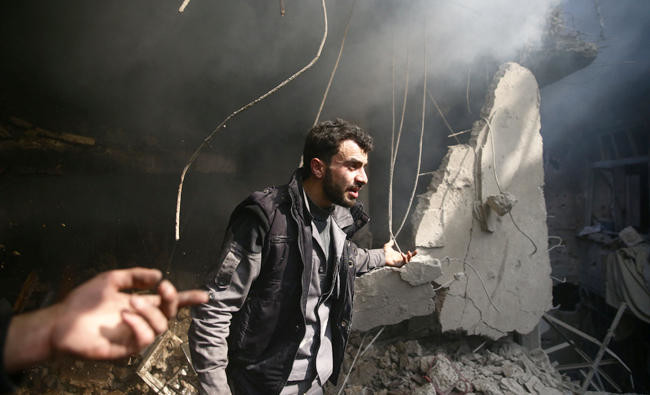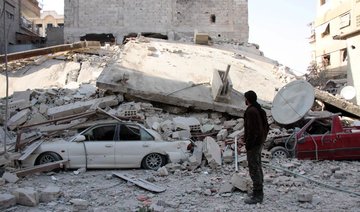AMMAN: Russia should intervene to prevent Syria’s war escalating into a new phase that sets Israel and militias allied with Iran “on a collision course”.
The call was made by the International Crisis Group in a report published Thursday that warned that an even broader war could be one miscalculation away.
The animosity between Iran and Israel has increasingly translated into violence on Syria’s complex battlefield with Israel targeting Iranian efforts to establish a permanent presence in Syria.
The report, “Israel, Hizbollah and Iran: Preventing a New War in Syria”, says Russia, one of the Bashar Al Assad’s most important supporters “is the only power in Syria in a position to broker a new understanding that reduces the risk of a larger confrontation.”
A “new phase in Syria’s war has set Israel and militias allied with Iran on a collision course,” the report says.
Having seized back territory in south-west Syria last month, Assad forces and their Iranian backed allies might soon reclaim much of the area up to Israel’s disputed border, the Brussels based group said.
“The fear of Iran-backed militias digging in close to Israel’s borders is decreasing Israel's willingness to remain a bystander. An uptick in Israeli airstrikes on arms convoys and other targets in Syria suggests incremental escalation is already occurring.”
Ofer Zalzberg, a senior analyst with Crisis Group, told Arab News that Iran seems intent on establishing a permanent military presence in Syria.
“Syria of course is a neighbor of Israel and this development could affect the next war dramatically.”
Israel has attacked arms production facilities near Damascus three times.
“The first two of the three sites were said to be Iranian, said Zalzberg. The third one, attacked on Wednesday, is “said to have been producing chemical weapons.”
Zalzberg told Arab News that a political solution is needed.
“We don't share the view that Iran has to leave Syria all together. We suggest Iran stays politically and economically involved in Syria but that it should not have a permanent military presence.”
The Crisis Group analyst suggested that Russia brokers a deal within which Israel will acquiesce to Iran’s influence in Damascus and will come to terms with the Syrian state’s symbolic return to south-western Syria, where the first protests of the 2011 uprising began.
But the Russians are finding it increasingly hard to balance between Iran and Israel, Zalzberg said.
The report said the tensions with Israel are particularly precarious because the “rules of the game” will probably be worked out through attack and response, risking a wider war.
Russia should be particularly invested in mediating between Israel and Iran because a conflict between them risks undermining Russia’s policy achievements in Syria, including strengthening the position of Assad.
On Wednesday, Syrian air defense systems intercepted an Israeli air attack on a military position near Damascus, the Syria military said.
“This morning, Israeli warplanes fired several missiles from Lebanese airspace on one of our military positions in the Damascus countryside,” said an army statement. “Our air defense systems blocked them and destroyed most of them.”
The Syrian Observatory for Human Rights said at least some Israeli missiles hit military targets near Damascus.
“Syria’s air defense system blocked some of the missiles, but others hit ammunition depots near Jamraya,” Observatory head Rami Abdel Rahman said.
Israel has carried out dozens of airstrikes on the Syrian armed forces and their allies since the civil war broke out there in 2011.
Israeli Prime Minister Benjamin Netanyahu visited the occupied Golan Heights on Tuesday with his security cabinet and top Israeli army officials.
“We seek peace but are prepared for any scenario and I wouldn’t suggest to anyone that they test us,” Netanyahu said during the visit.




















